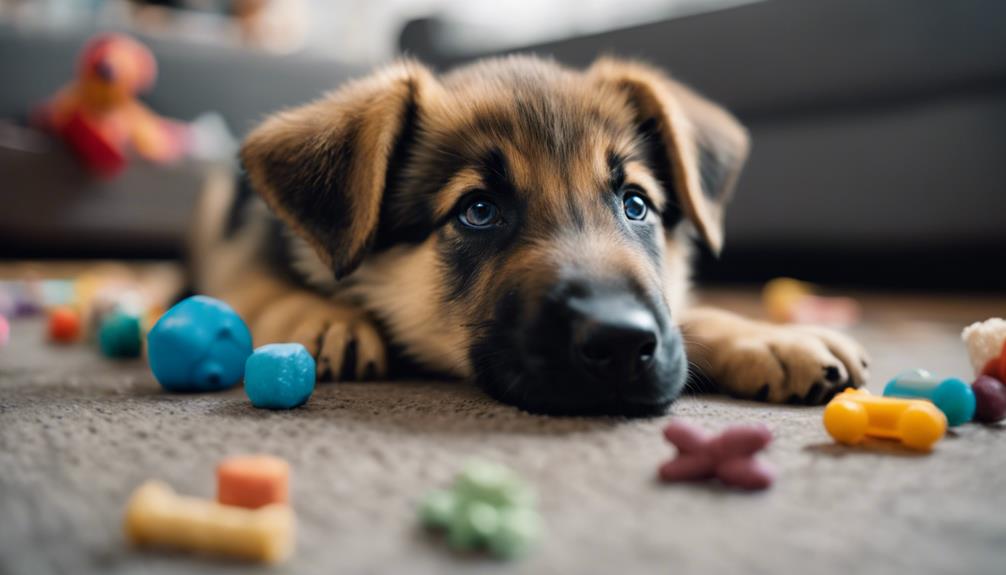🐾 Paw-some Partnership Alert! 🐾
As a pack of German Shepherd enthusiasts at MixGermanShepherd.com, we're always sniffing out the best products for our furry friends. Guess what? When you fetch something from Amazon through our links, we earn a little treat! 🦴
When training your German Shepherd mix puppy, starting with socialization is crucial for their development and behavior. Introducing them to various environments and experiences helps build their confidence and adaptability. But, what are the best methods for socialization that cater specifically to the needs of a German Shepherd mix? Understanding their unique traits and characteristics plays a significant role in shaping their training journey. Stay tuned to discover how to tailor your approach to effectively train your German Shepherd mix puppy for a harmonious life together.
Key Takeaways
- Proper socialization is essential for German Shepherd mix puppies' development.
- Consistent routines for feeding, potty breaks, and sleep are crucial.
- Positive reinforcement techniques help in obedience and behavior training.
- Mental stimulation and exercise are vital for a healthy and happy puppy.
Socialization for German Shepherd Mix Puppies
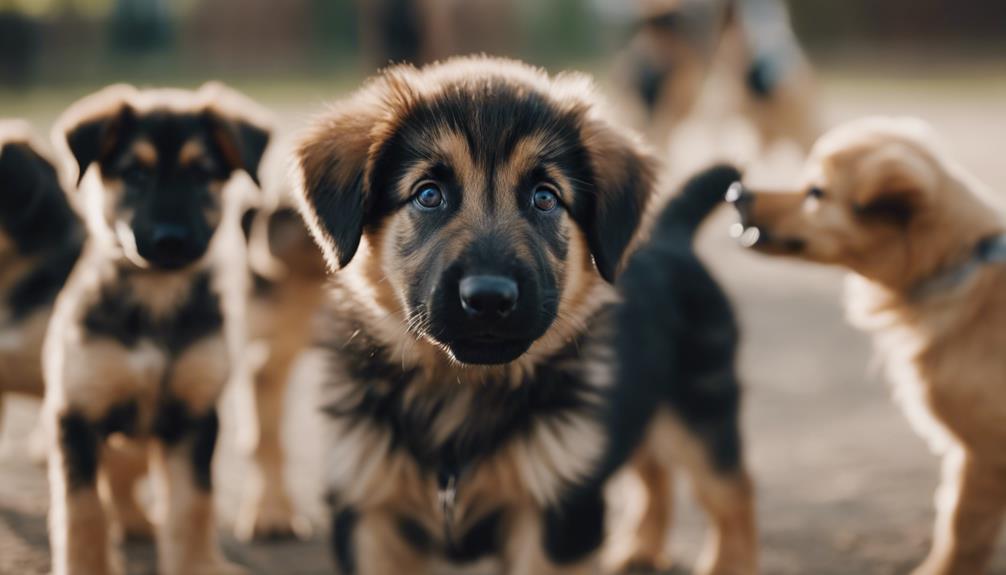
Proper socialization is crucial for German Shepherd mix puppies to ensure they develop into well-adjusted and confident adult dogs. Without adequate socialization, German Shepherd mix puppies may be more prone to behavior issues such as fearfulness, aggression, and anxiety. To prevent these problems, it is essential to introduce your puppy to a wide range of people, animals, and environments during their critical socialization window.
During this early stage of development, German Shepherd mix puppies are highly impressionable and receptive to new experiences. Exposing them to different stimuli in a positive and controlled manner helps them build good social skills and adaptability. Consistent socialization experiences that focus on positive interactions will lay the foundation for your puppy to grow into a well-rounded and balanced companion.
Crate Training Tips for Your Puppy
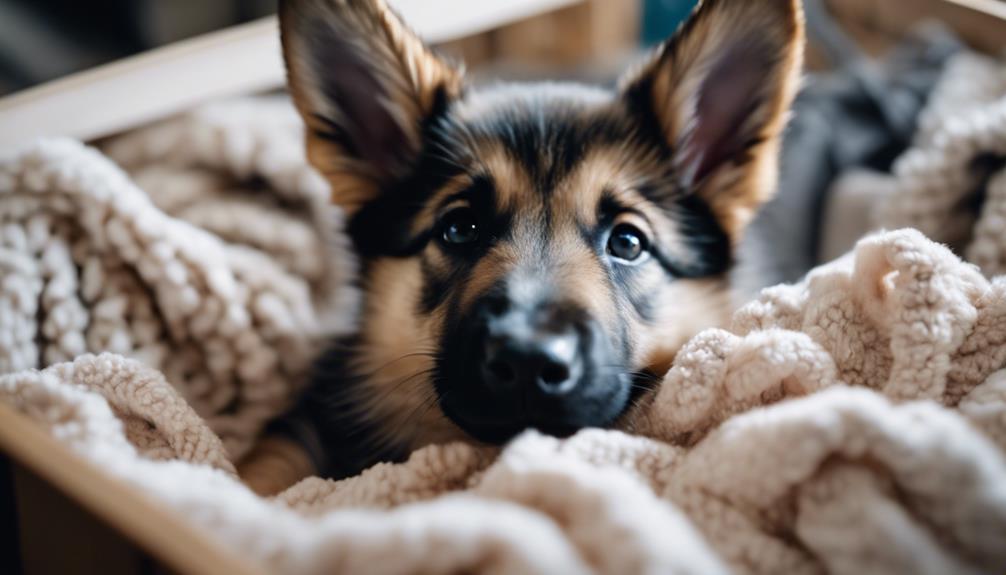
To ensure a smooth transition for your German Shepherd mix puppy, introducing crate training can provide a sense of security and structure in their daily routine. Crate training is a valuable tool not only for potty training but also for creating a safe space for your puppy to retreat to when needed. Here are some tips to help you effectively crate train your German Shepherd puppy:
| Crate Training Tips | Description |
|---|---|
| Introduce Gradually | Start by associating the crate with positive experiences like treats and toys. |
| Short Periods Initially | Begin with short periods in the crate to prevent anxiety and gradually increase the time. |
| Avoid Punishment | Never use the crate as a form of punishment to maintain a positive association with it. |
| Cozy Environment | Make the crate cozy with bedding and consider covering it partially for a den-like feel. |
Housetraining Your German Shepherd Mix
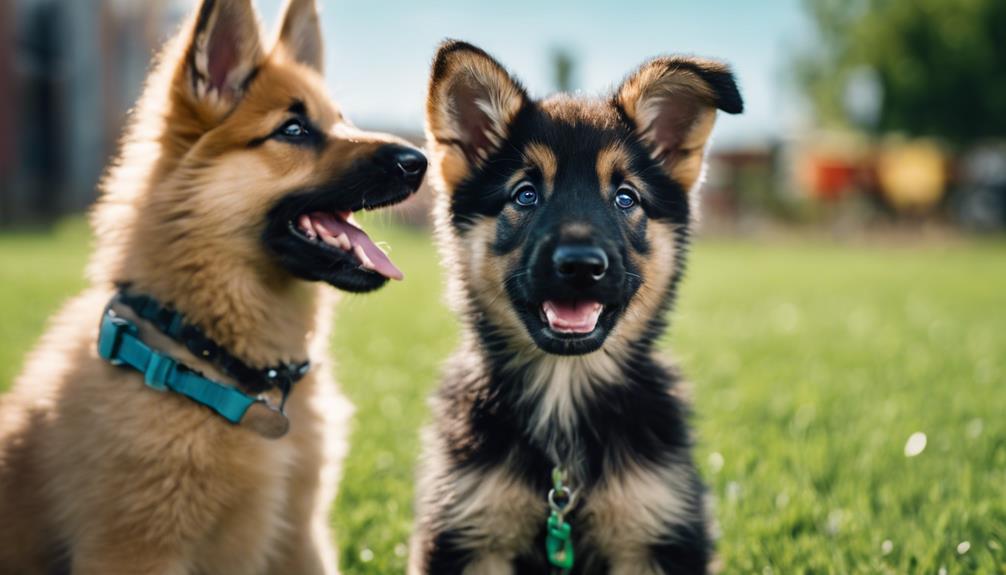
To successfully housetrain your German Shepherd mix puppy, it's crucial to establish a consistent routine that includes regular potty breaks outside. Using positive reinforcement techniques such as treats and praise can help reinforce good bathroom habits. By closely supervising your puppy and creating a designated potty area outside, you can encourage proper elimination behaviors and minimize accidents indoors.
Crate Training Benefits
Utilizing a dog's natural den instincts, crate training benefits housetraining your German Shepherd mix by providing a safe and secure environment for effective training. Here are some key advantages of crate training:
- Establishes Routine: Helps in creating a consistent schedule for feeding, potty breaks, and sleep, aiding in housetraining.
- Prevents Destructive Behaviors: Crates offer a secure space, preventing your puppy from engaging in destructive activities when unsupervised.
- Reduces Anxiety: Proper crate training can lower separation anxiety and stress levels in German Shepherd mix puppies.
- Positive Association: Gradual introduction to the crate with positive reinforcement builds a positive relationship with this training tool.
Crate training is a valuable tool recommended by dog trainers for successful puppy training.
Establishing Routine Schedule
Establishing a routine schedule for housetraining your German Shepherd mix is crucial for fostering successful potty training habits. Consistency is key in helping your puppy understand when and where they should go to the bathroom. Start by setting a regular feeding schedule to regulate their bathroom breaks. Take your puppy outside after meals, naps, and playtime to encourage elimination outside. Utilize positive reinforcement techniques such as treats and praise when your puppy goes potty in the designated area. Monitor their water intake and ensure they have frequent bathroom breaks, especially during the housetraining process. By creating a structured routine and using positive reinforcement, you can help your German Shepherd mix puppy learn good bathroom habits efficiently.
Starting Obedience Training
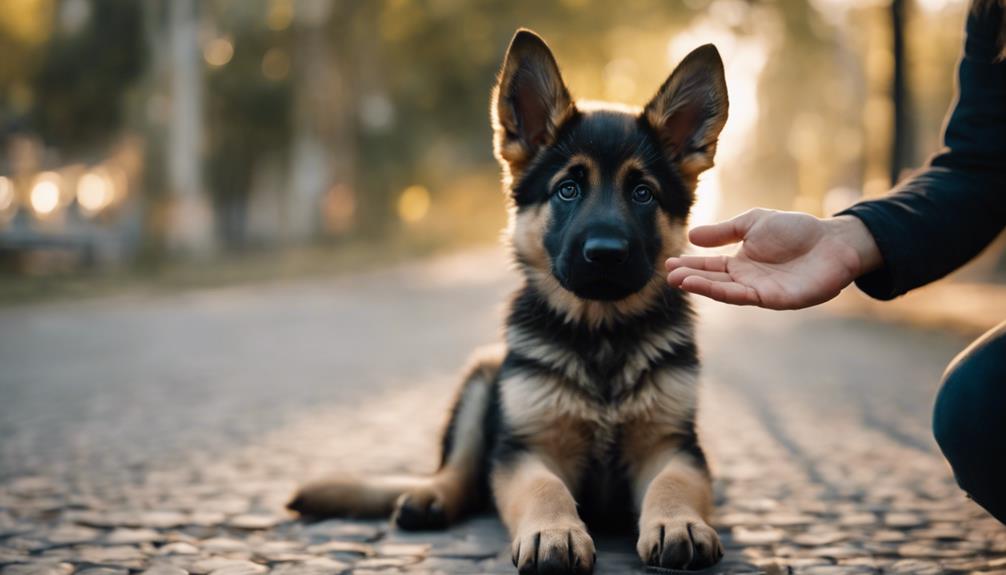
Commence early obedience training with your German Shepherd mix puppy to lay a solid behavioral groundwork. Starting training from an early age is crucial for setting the right tone and building a strong bond with your furry companion. Here are some essential tips to help you kickstart your obedience training sessions effectively:
- Use Positive Reinforcement: Motivate and encourage your puppy by rewarding good behavior with treats, praise, or toys.
- Focus on Basic Commands: Teach fundamental commands like sit, stay, come, and heel to establish a solid foundation for more advanced training.
- Consistency is Key: Practice consistency in your training sessions to help your puppy learn and retain new skills effectively.
- Incorporate Daily Sessions: Integrate short, daily training sessions into your routine to reinforce learning and strengthen the bond with your puppy.
Teaching Recall Commands
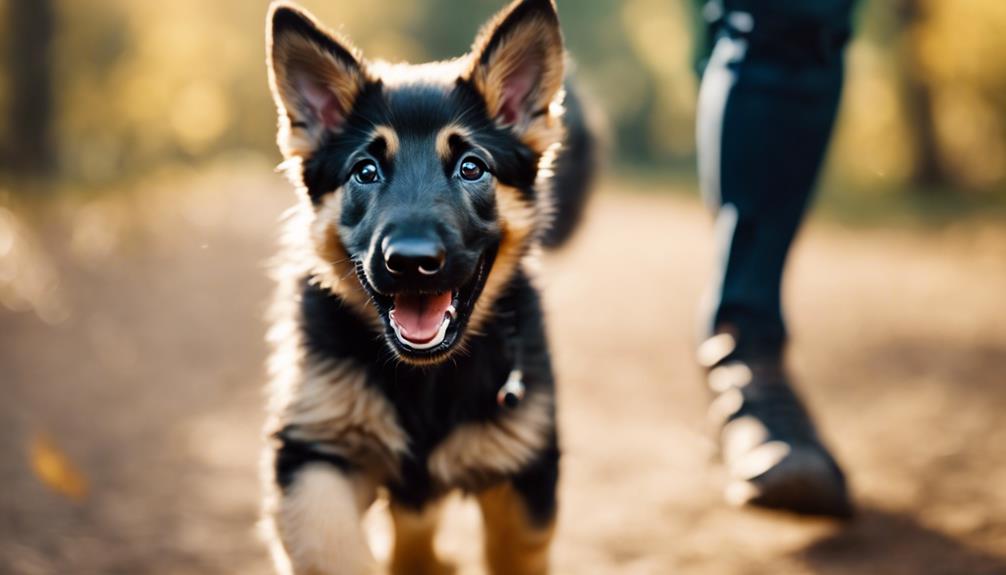
When teaching recall commands to your German Shepherd mix puppy, focus on using high-value rewards to reinforce positive behavior. Consistent practice in controlled environments helps build a reliable response to your recall command. By gradually increasing distance and distractions, you can strengthen your puppy's recall skills over time.
Recall Training Techniques
To enhance your German Shepherd mix puppy's recall skills, start recall training early in a distraction-free setting with short distances to establish a strong foundation. Here are some techniques to help you with recall training:
- Use high-value treats or toys as rewards for coming when called to reinforce positive behavior.
- Practice recall commands consistently in various locations and gradually increase distance to improve reliability.
- Avoid using recall commands for negative situations to maintain a positive association with coming when called.
- Incorporate fun games like hide and seek to make recall training engaging and enjoyable for your puppy.
Consistency and Practice
For reinforcing reliable behavior in your German Shepherd mix puppy, consistency and practice are key when teaching recall commands. Make sure to practice recall commands consistently, using high-value treats or toys to keep your puppy engaged and motivated. Start recall training in a controlled environment, gradually introducing distractions as your puppy becomes more proficient. Remember to avoid punishing your puppy for not responding immediately; instead, focus on positive reinforcement to encourage desired behavior. Incorporate recall training into your daily routines and play sessions to make it a natural and enjoyable part of your puppy's learning experience.
| Training a German Shepherd | Recall Commands | Positive Reinforcement |
|---|---|---|
| Consistency is crucial | Engage with treats/toys | Focus on rewarding good behavior |
| Start in controlled setting | Gradually add distractions | Avoid punishment, use positive reinforcement |
Developing Impulse Control
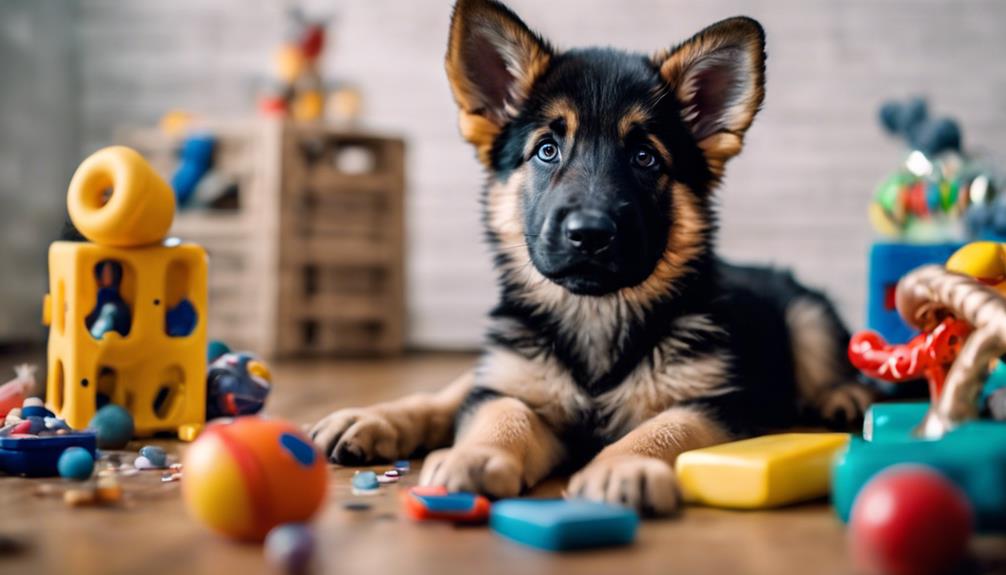
Developing impulse control in German Shepherd mix puppies is crucial for managing their natural instincts and behaviors effectively. Teaching impulse control can prevent jumping, nipping, and other unwanted behaviors in German Shepherd mixes. To help your puppy develop impulse control, consider the following tips:
- Practice Patience: Impulse control training takes time and consistency. Be patient with your puppy as they learn to wait and exhibit self-control.
- Use Positive Reinforcement: Reward good behavior to reinforce impulse control. Treats, praise, and toys can be effective motivators.
- Set Clear Expectations: Establish boundaries and rules to help your puppy understand what is expected of them.
- Regular Training Sessions: Consistent practice is key to developing impulse control. Schedule regular training sessions to reinforce good behavior and improve obedience.
Advanced Obedience Training Methods
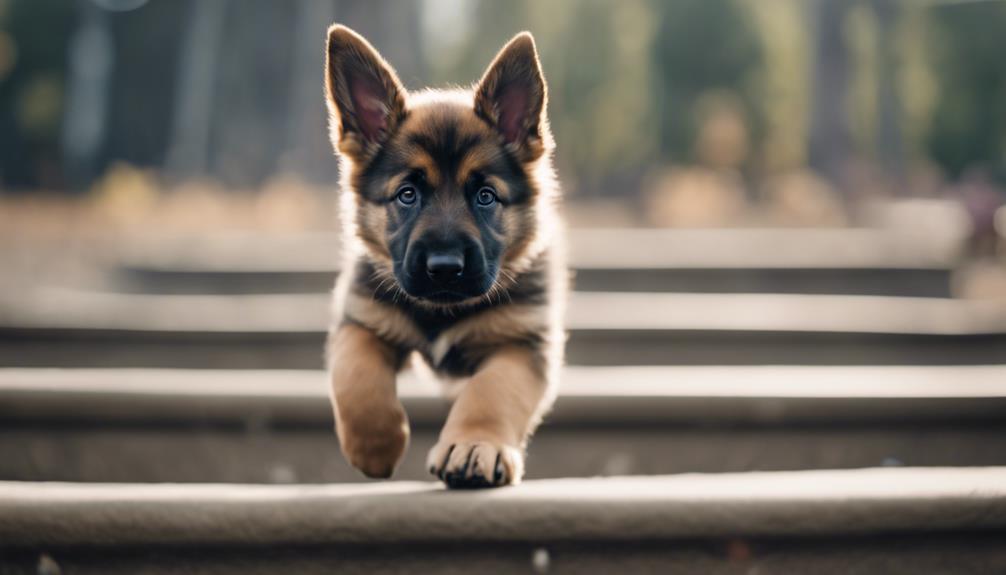
Enhance your German Shepherd mix puppy's obedience skills with advanced training methods like shaping, targeting, and capturing behaviors. Utilizing positive reinforcement techniques, such as clicker training and high-value treats, can motivate and reward desired behaviors during these sessions. Strengthen verbal cues and hand signals for more complex commands to enhance communication and responsiveness in your German Shepherd mix puppy.
To help visualize the benefits of advanced obedience training, consider the following emotional impact table:
| Training Method | Description | Emotional Impact |
|---|---|---|
| Shaping | Gradually molding behaviors towards the desired outcome | Sense of accomplishment and progress |
| Targeting | Teaching your puppy to touch a specific target on cue | Bonding through cooperation and learning |
| Capturing Behaviors | Capturing and rewarding spontaneous displays of desired behaviors | Joy in the unexpected and reinforcement of good habits |
Introduce distractions gradually to proof commands and improve your puppy's focus and obedience in various environments. Seeking guidance from professional trainers or enrolling in advanced obedience classes can further enhance your German Shepherd mix puppy's obedience skills and behavior management.
Leash Training Techniques
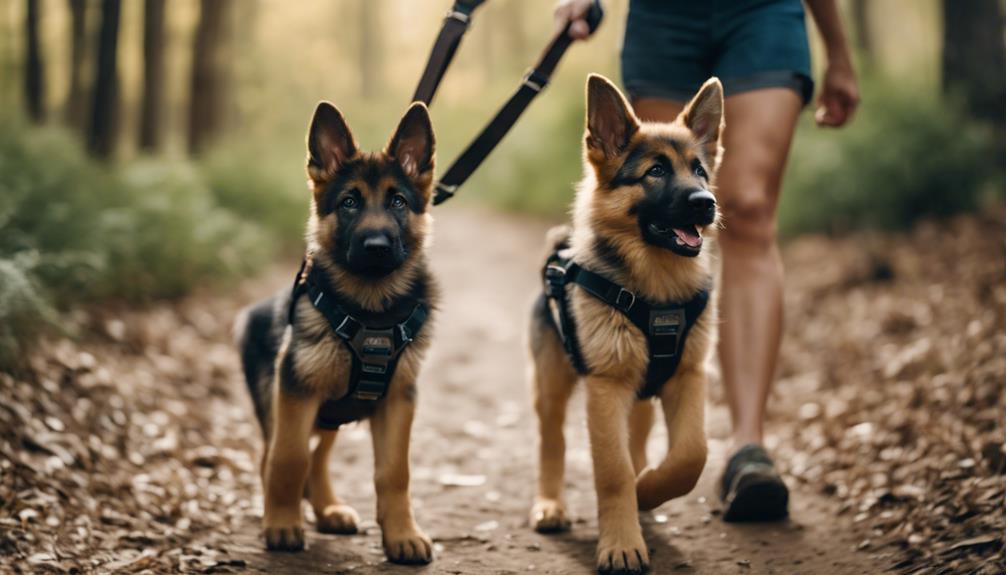
Utilize a sturdy leash and harness to establish control and ensure safety while initiating leash training with your German Shepherd mix puppy. When it comes to leash training techniques, follow these guidelines to help your puppy learn how to walk on a leash effectively:
- Start in a quiet, distraction-free environment: Begin the training in a place where there are minimal distractions to help your puppy focus on learning how to walk on a leash.
- Practice loose leash walking: Reward your puppy for walking calmly beside you without pulling on the leash. Positive reinforcement will encourage good behavior.
- Avoid pulling or yanking on the leash: Harsh corrections can create negative associations with walking on a leash. Instead, use gentle guidance and positive reinforcement.
- Gradually increase duration and distractions: As your puppy gets more comfortable walking on a leash, slowly introduce more challenging environments and distractions to improve their leash walking skills and socialization.
Teaching Basic Commands
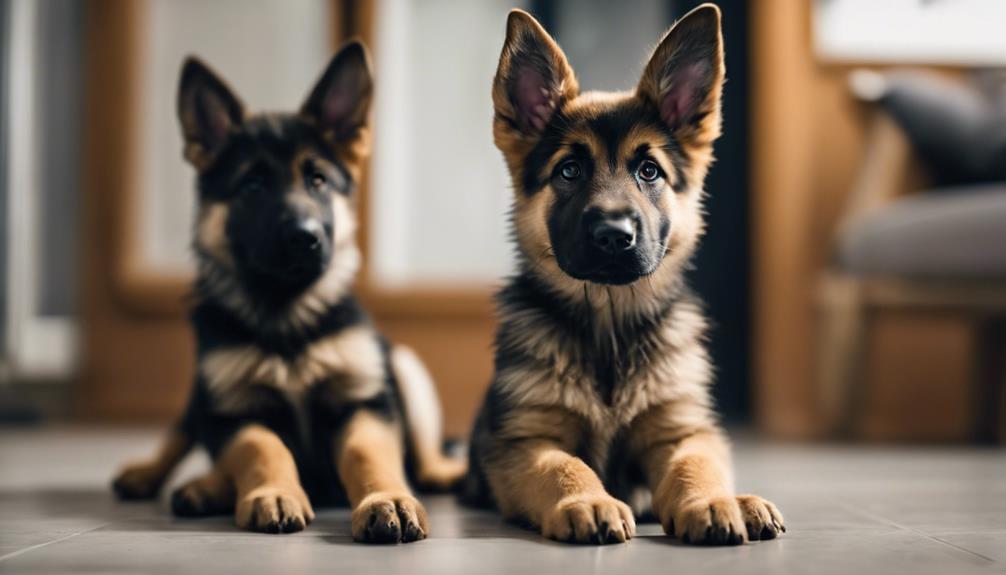
Start teaching your German Shepherd mix puppy basic commands like sit, stay, come, heel, and leave it using positive reinforcement techniques. Socialize your puppy to different environments, people, and animals to help them become well-rounded and confident. When teaching these commands, use treats, praise, and toys to reward good behavior. Consistency and patience are key; break down each command into small steps to make it easier for your puppy to understand and follow. For example, when teaching your puppy to come when called, start in a quiet, familiar space before progressing to more distracting environments. Remember to keep training sessions short, engaging, and fun to maintain your puppy's interest and focus. By practicing these basic commands regularly, you will build a strong foundation for further training and strengthen the bond between you and your German Shepherd mix puppy.
Addressing Destructive Behaviors
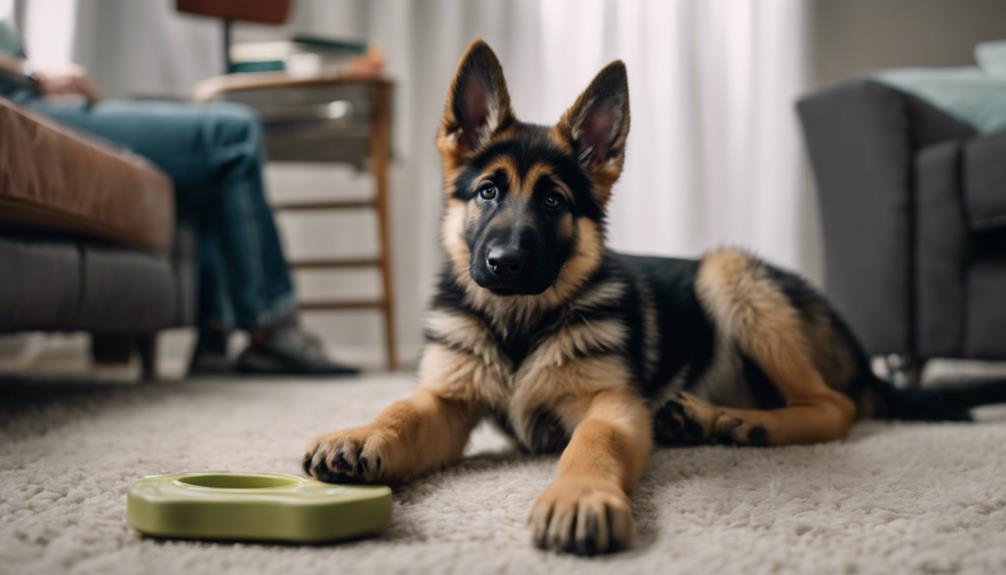
To address destructive behaviors in your German Shepherd mix puppy, focus on providing ample physical and mental stimulation to prevent boredom. Here are some strategies to help redirect destructive tendencies:
- Crate Training: Utilize crate training to create a safe space for your puppy and prevent destructive behaviors when unsupervised.
- Positive Reinforcement: Use positive reinforcement techniques to reward good behavior and encourage appropriate chewing and digging habits.
- Appropriate Chew Toys and Puzzles: Offer a variety of chew toys and interactive puzzles to keep your puppy mentally engaged and discourage destructive chewing.
- Consistent Routine and Exercise: Establish a consistent daily routine and provide regular exercise to help burn off excess energy and reduce the likelihood of destructive behaviors.
Consider enrolling your German Shepherd mix puppy in a socialization class to further enhance their training and behavior. If you continue to experience challenges with destructive behaviors, seeking guidance from a professional trainer or behaviorist can provide additional support and tailored strategies for your specific situation.
Handling Aggression in Puppies
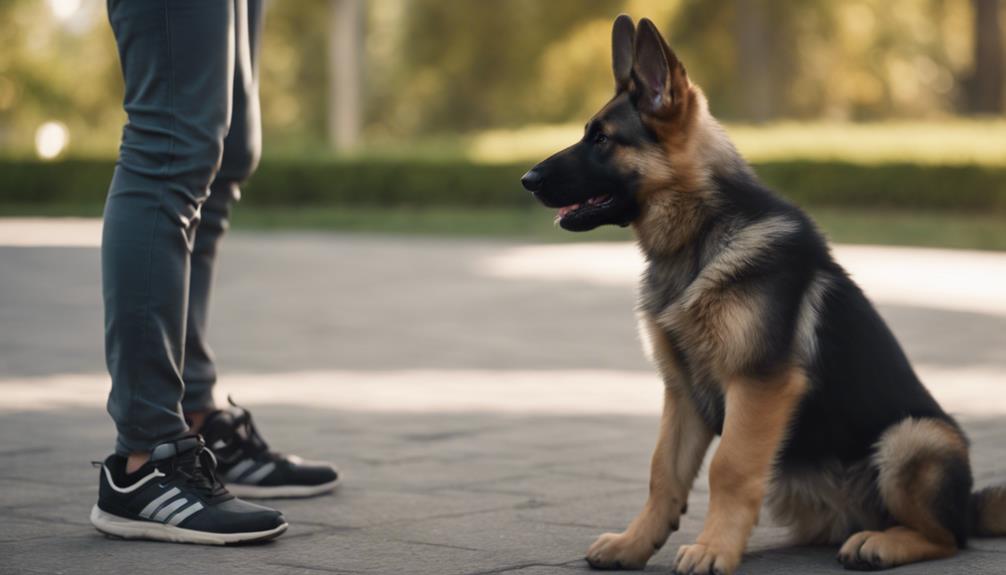
Addressing aggression in puppies requires understanding the underlying triggers and implementing appropriate training techniques to redirect their behavior towards more acceptable actions. Aggression in German Shepherd mix puppies can be normal during play but should not be tolerated if it escalates. To effectively address aggression, identify triggers and use positive reinforcement training methods. Seeking guidance from a professional trainer or behaviorist is advisable if your puppy's aggression becomes concerning or unmanageable. Consistent training, socialization, and setting clear boundaries can help prevent and address aggression in German Shepherd mix puppies.
| Triggers for Aggression | Positive Training Techniques |
|---|---|
| Fear | Use desensitization and counterconditioning methods to build confidence. |
| Possessiveness | Teach "drop it" and "leave it" commands using rewards. |
| Overstimulation | Implement structured play sessions and provide regular breaks. |
| Territoriality | Gradually desensitize your puppy to new people and environments. |
| Lack of socialization | Expose your puppy to various experiences in a controlled and positive manner. |
Building Confidence in Your Puppy
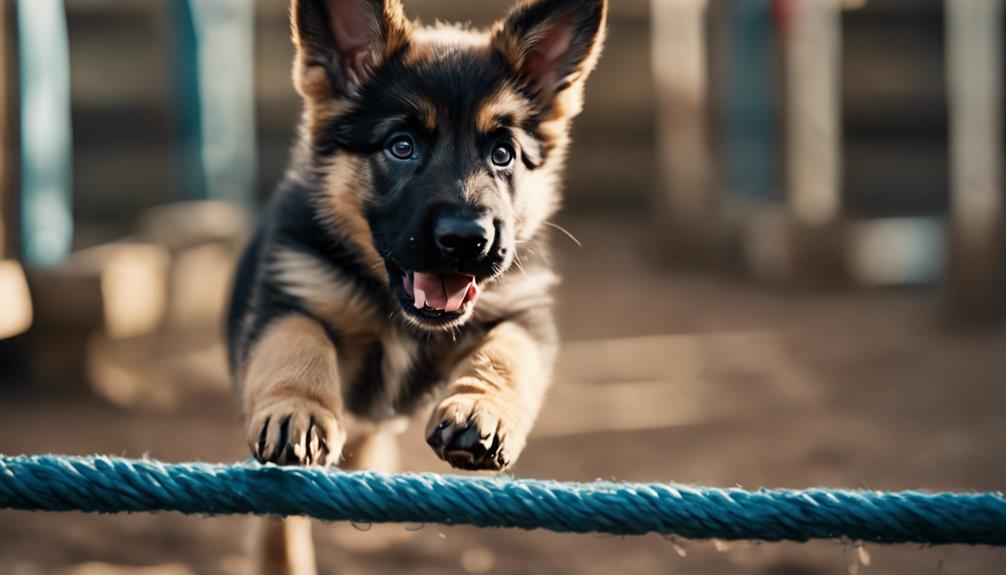
When fostering a German Shepherd mix puppy, helping them build confidence is essential for their overall well-being and development. To assist in boosting your puppy's confidence, consider the following strategies:
- Expose your puppy to various environments and experiences: By gradually introducing your puppy to different surroundings, you can help them feel more at ease and capable in unfamiliar situations.
- Utilize positive reinforcement: Reward your puppy with treats and praise when they exhibit confident behavior, reinforcing their self-assurance.
- Socialize your puppy: Slowly introduce your puppy to new people, animals, and situations to help them feel secure and comfortable in various social settings.
- Encourage exploration and play: Allow your puppy to explore their surroundings and engage in play to help them overcome fears and develop resilience.
Mental Stimulation Activities
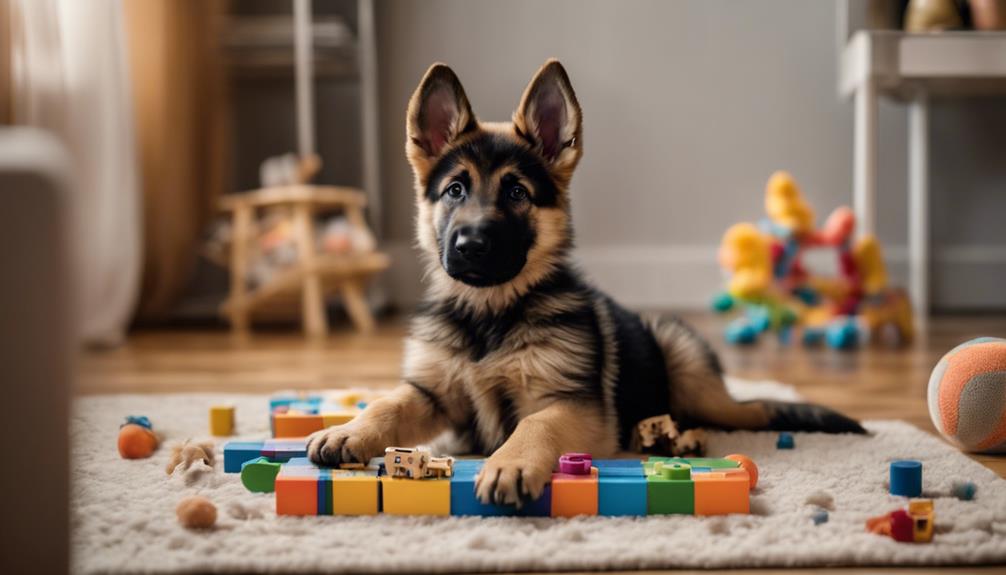
To engage your German Shepherd mix puppy's intelligence and prevent boredom, consider incorporating puzzle toys for enrichment and daily obedience training sessions for focus. These activities can provide mental stimulation, challenge their problem-solving skills, and strengthen the bond between you and your puppy. By offering a variety of mental challenges, you can help your puppy develop into a well-rounded and mentally sharp companion.
Puzzle Toys for Enrichment
Puzzle toys play a crucial role in providing mental stimulation for German Shepherd mix puppies, engaging their problem-solving skills and preventing boredom. Interactive puzzle toys challenge their cognitive abilities, reduce the likelihood of problem behaviors, and keep them mentally sharp. Offering a variety of toys with different difficulty levels can help improve memory and overall well-being. These toys not only entertain but also serve as a great way to provide enrichment and mental exercise for your puppy. By incorporating puzzle toys into your German Shepherd mix's routine, you can promote a healthy outlet for their energy and curiosity, fostering a happy and well-adjusted companion.
Obedience Training for Focus
To further enhance your German Shepherd mix puppy's mental stimulation and focus, incorporating obedience training into daily activities is essential. These high-energy pups thrive on mental stimulation, making obedience training a perfect way to channel their energy. By engaging in obedience training sessions, you not only improve your puppy's focus but also strengthen the bond between you and your furry companion. Remember to keep training sessions short and varied to prevent boredom and maintain interest. Teaching basic commands like sit, stay, and come not only enhances focus but also helps your puppy respond to cues effectively. Engage in activities that challenge your puppy's problem-solving skills to promote mental stimulation and focus, ensuring a well-rounded and happy companion.
Exercise and Playtime Recommendations
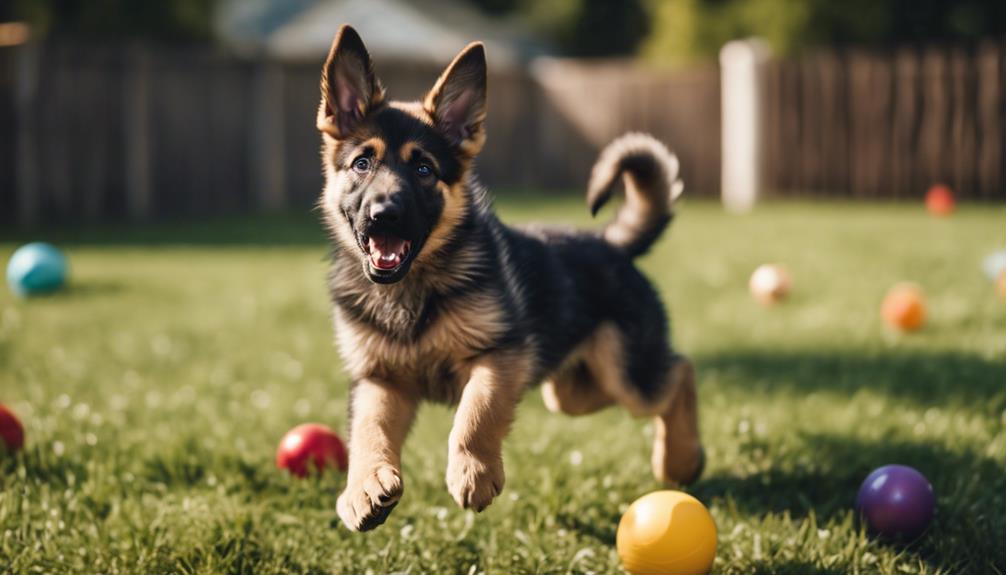
German Shepherd mix puppies need at least one to two hours of daily exercise to maintain their health and happiness. To ensure your puppy stays active and content, consider the following recommendations:
- Engage in interactive play sessions to stimulate their intelligence and meet their high energy levels.
- Incorporate mental stimulation activities like puzzle toys and obedience training to keep them mentally sharp.
- Rotate different types of exercises to prevent boredom and maintain their physical fitness.
- Supervise playtime to ensure safety and provide a positive outlet for their energy and instincts.
Training Progression Over Two Years
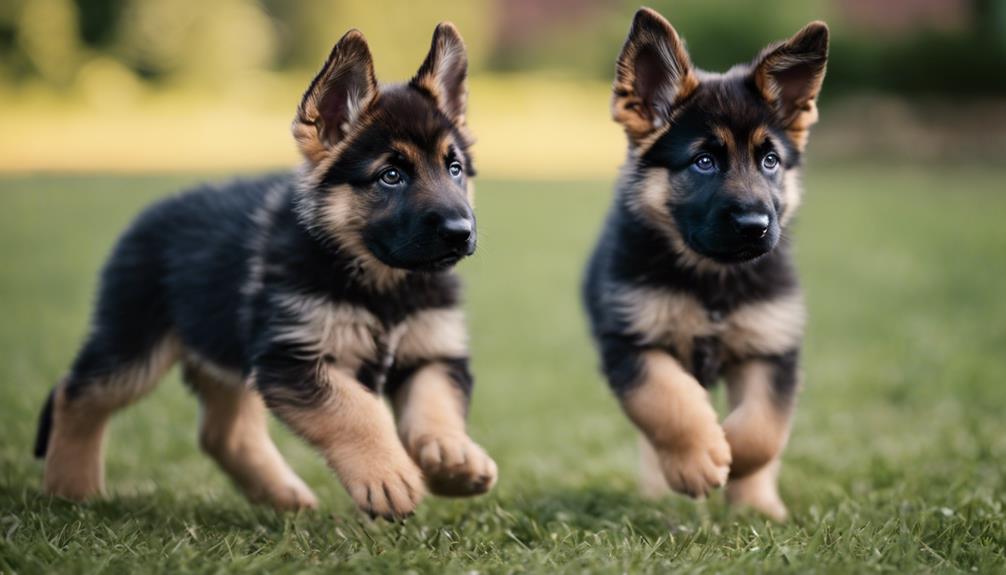
Begin your journey of training progression with your German Shepherd mix puppy by focusing on basic obedience training, socialization, and laying a strong foundation for advanced skills during the first year. Puppies need consistent training from an early age to shape desirable behaviors. Transition to adult training around 1 year old, introducing advanced commands and activities. Implement ongoing training, gradually increasing complexity and difficulty over the two-year period to ensure steady development. Positive reinforcement is key in shaping behaviors. By the end of the second year, your German Shepherd mix should have a solid foundation for various activities and environments.
| Training Stage | Description | Tips |
|---|---|---|
| Basic Obedience | Focus on commands like sit, stay, and come. | Use treats and praise consistently. |
| Advanced Commands | Introduce complex commands like heel, leave it, and fetch. | Practice in different environments for variety. |
| Specialized Activities | Engage in agility training, search games, or therapy work. | Tailor activities to your dog's strengths. |
Frequently Asked Questions
Are German Shepherd Mix Easy to Train?
Training a German Shepherd mix can be challenging due to potential behavioral issues. Consistent positive reinforcement techniques and early socialization are crucial. Understanding breed influences and tailoring training to individual needs will enhance success.
How Do You Train a German Shepherd Mix?
To train a German Shepherd mix effectively, use positive reinforcement for obedience training. Focus on socialization, leash manners, and housebreaking. Crate training can aid in housebreaking. Consistency, patience, and tailored exercises are vital for their well-being.
What Should I Teach My German Shepherd Puppy First?
Start with crate training and potty training to establish routine. Then focus on socialization and basic obedience like sit, stay, and come. Introduce leash manners and recall training to build a well-rounded German Shepherd mix puppy.
Are German Shepherd Puppies Hard to Train?
Training German Shepherd puppies may present challenges due to their energy and protective nature. However, with positive reinforcement, consistency, early socialization, and patience, you can successfully teach them obedience. Understand their intelligence and eagerness to please for effective training.
Conclusion
In conclusion, training your German Shepherd mix puppy is a rewarding journey that requires patience, consistency, and positive reinforcement. Remember, Rome wasn't built in a day, and neither is a well-behaved and obedient furry companion. So, keep calm and carry on with your training efforts, and before you know it, you'll be reaping the rewards of a well-trained and confident pup. Keep up the good work, and soon you'll see the fruits of your labor blossom like a beautiful garden in spring.
